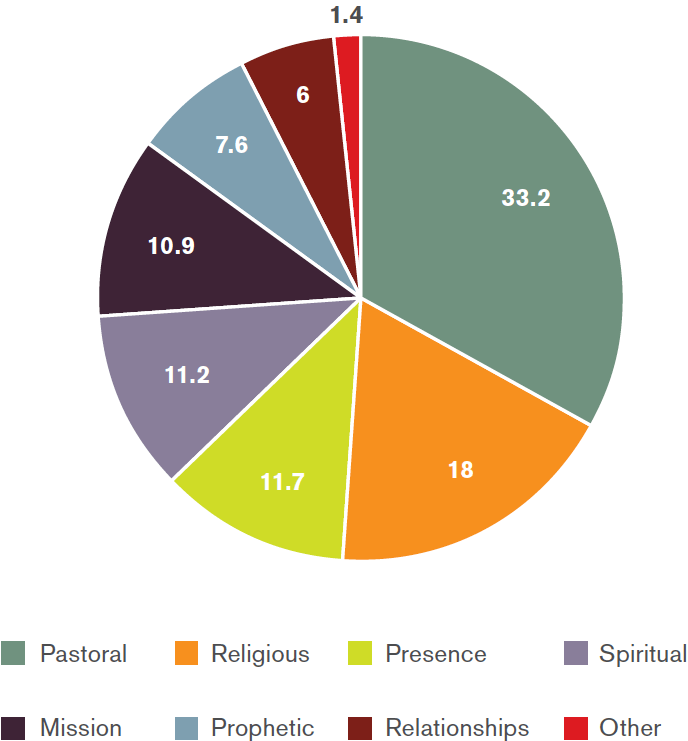Chaplains gave many different answers when asked what they saw as chaplaincy’s main aim. They listed pastoral work (supporting students, often on a one-to-one basis to promote their wellbeing and address challenges and problems) and religious work (facilitating religious understanding and practice) as the two main aims, as Figure 3 shows. One third of chaplains see their primary aim as pastoral, and one sixth as religious.

There are some differences between how Christian chaplains view chaplaincy compared to chaplains of other faiths. Non-Christian chaplains emphasise the religious and pastoral role of chaplains, but Christians – perhaps because they are established, better resourced and better able to define their role according to their own understanding – have a wider range of aims, including mission, ‘[t]o be a witness to the concern that God has for the whole of the world, not just the religious’ (Methodist chaplain, red brick), and what they call being a visible and available ‘presence’. ‘It is to be who I am in this context from which meaningful doing flows’ (Anglican chaplain, post-1992). Theologically, this is rooted in the notion of gift; being comes before doing.
The majority of chaplains elect to use generic, ‘secular’ language to describe their aims, rather than language that is explicitly theological (the exception being when chaplains talk of mission). Significantly, not a single non-Christian chaplain interviewed by telephone expressed their aim with reference to the beliefs they held. It may be that chaplains are experiencing a pressure to conform to the perceived expectations of university managers, who are likely to understand the language of student support but not the language of theology and belief.
University managers also see pastoral and religious aims as the main purposes of chaplaincy and clearly appreciate chaplains’ student support role. As the Deputy Director of Student Services at the post-1992 university said, highlighting chaplains’ pastoral contribution:
‘Chaplaincy makes a significance difference to…individual students’ experience and lives – particularly students who may be vulnerable, or be looking for some support.’
The Director of Student Experience at the red brick university emphasised chaplains’ religious role:
‘We turn to [chaplains] for advice and guidance about specific things that crop up during the year. That might be how we should best deal with Ramadan during exams, for example, and we’ll liaise with the Muslim chaplain and talk about that. In some cases, we’ve had anti-Semitism and unfortunate things like that. We might talk to [the Jewish Chaplain] about…’what does it feel like on the ground for Jewish students from your perspective?’
University managers have little conception, however, that chaplaincy might include a prophetic or a missional role. Neither do they necessarily appreciate, unlike the students who use chaplaincy services, that maintaining integrity of faith while serving the university is a live issue for chaplains and the religious organisations responsible for chaplaincy: chaplains do not see themselves simply as delivering a service, rather their role flows from embodying and representing their faith and belief tradition in the university. Managers tend to see chaplains from the ‘outside’ as those who can deliver certain outcomes, rather than from the ‘inside’ as people who wrestle with questions of religious motivation and identity. This may also reflect relatively low levels of religious literacy among some university managers.
Students also emphasised the importance of chaplains’ pastoral care role. They particularly appreciate chaplains who are, in their words, ‘approachable’; ‘friendly’; ‘warm’; ‘visible’; ‘a presence’; ‘available’; ‘non-judgemental’. University managers and students both agree that chaplaincy provides something unique that cannot be replicated elsewhere in a university. Four out of five students agreed with the statement ‘Chaplains provide pastoral support in a way professional support services cannot’. Students said:
‘[chaplains] can listen to students and provide help or advice without a predetermined plan, agenda, or expected end goal as usually professional services do.’ (Christian, EU student, traditional elite)
‘I think they promote an important part of life that can be forgotten amidst the stress of studying and deadlines. And this cannot be neglected. A couple of years ago in a close-by university, a student took his own life. Stress is dangerous and having faith and nurturing the spiritual side of life is important to balance things up.’ (Muslim, international student, traditional elite)
‘It’s so vitally important. Although we have student services, the chaplaincy offers a different type of advice and solace on a spiritual, more personal level. Knowing it is there and that I won’t be judged for whatever my views are on religion is a quiet relief and a unique, special element to the university used by students and staff alike. Very important.’ (Christian, home student, traditional elite)
